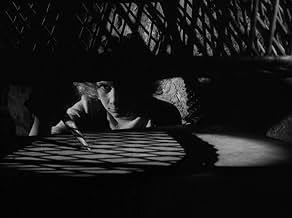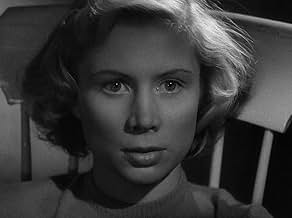NOTE IMDb
6,7/10
2,3 k
MA NOTE
Un réalisateur essaie de créer le meilleur film de l'histoire, mais découvre que les capacités humaines ont leurs limites.Un réalisateur essaie de créer le meilleur film de l'histoire, mais découvre que les capacités humaines ont leurs limites.Un réalisateur essaie de créer le meilleur film de l'histoire, mais découvre que les capacités humaines ont leurs limites.
- Réalisation
- Scénario
- Casting principal
Birgit Lindkvist
- Anna - inneboende på pensionatet
- (as Bibi Lindkvist)
John W. Björling
- En man i Birgitta Carolinas dröm
- (non crédité)
Sven Björling
- En filmarbetare i ateljén
- (non crédité)
Anita Blom
- Anna - Signes kusindotter
- (non crédité)
Britta Brunius
- Lasses mamma
- (non crédité)
Åke Engfeldt
- Ena kriminalpolisen
- (non crédité)
Gösta Ericsson
- Andra kriminalpolisen
- (non crédité)
Kenne Fant
- Arne - Skådespelare
- (non crédité)
Avis à la une
An ex Maths teacher announces he's just been released from a lunatic asylum (as you do) to some people making a film. (He used to teach one of them). He says that he has ideas about the Devil. The filmmakers try to adapt those ideas into a screenplay. Apparently they reject those ideas -after making them - for this film presumably.
The meandering narrative seems to explore scenarios that surround some pretty miserable and uninteresting people. I think I read that it's Bergman's first film to look solely at mild horror and the place of the Devil, both in philosophy, film and in folklore. Suicide, alcoholism, prostitution, even drowning babies born to the under-aged get limp, clumsy and unconvincing treatment.
It's pretty impossible to follow and no doubt spoilt by knowing what gems came later from the Master of Darkness.
Best thing to come out of it was a line that I've slightly altered - "Life Itself is a terminal illness "
The meandering narrative seems to explore scenarios that surround some pretty miserable and uninteresting people. I think I read that it's Bergman's first film to look solely at mild horror and the place of the Devil, both in philosophy, film and in folklore. Suicide, alcoholism, prostitution, even drowning babies born to the under-aged get limp, clumsy and unconvincing treatment.
It's pretty impossible to follow and no doubt spoilt by knowing what gems came later from the Master of Darkness.
Best thing to come out of it was a line that I've slightly altered - "Life Itself is a terminal illness "
This is the earliest Bergman film that I've watched, and already the prime concerns that occupied him throughout most of his career - human relationships, sex, faith, death, etc. - are well in evidence.
Interestingly, the narrative is set against a motion-picture backdrop; in fact, the film demonstrates a self-conscious approach to the medium that would re-emerge in later efforts such as PERSONA (1966) and THE PASSION OF ANNA (1969): rather than observing the normal procedure for the time, the credits don't appear at the outset but, effectively interrupting the proceedings after the first reel, these are given in a voice-over! Besides, the plot seems to be following the interconnecting vicissitudes of a variety of characters - but chiefly the crisis facing two separate couples - all of which, somewhat murkily and pretentiously, serves as a morality play about the triumph of Evil over Good, as envisioned in a framework set inside a studio and involving a film director's old ex-professor (the former happens to be the elder brother of one of the characters in the main narrative!).
It's all rather fascinating for much of the running-time - and the director's visual style really can't be faulted (a dream sequence is especially effective and there's even a short and quite amusing Silent slapstick film-within-a-film, ostensibly the amateurish work of one of the characters!) - but, eventually, the over-ambitious structure of PRISON (by the way, neither this vague title nor the equally well-known alternate given the film on its American release, THE DEVIL'S WANTON, really serve the purpose of its existentialist theme and generally introspective tone), to say nothing of the relentless gloominess, wear the whole down somewhat. All in all, however, it's a fine piece of work from a film-maker who would go on to become one of the leading forces in cinema during the second half of the 20th century.
Interestingly, the narrative is set against a motion-picture backdrop; in fact, the film demonstrates a self-conscious approach to the medium that would re-emerge in later efforts such as PERSONA (1966) and THE PASSION OF ANNA (1969): rather than observing the normal procedure for the time, the credits don't appear at the outset but, effectively interrupting the proceedings after the first reel, these are given in a voice-over! Besides, the plot seems to be following the interconnecting vicissitudes of a variety of characters - but chiefly the crisis facing two separate couples - all of which, somewhat murkily and pretentiously, serves as a morality play about the triumph of Evil over Good, as envisioned in a framework set inside a studio and involving a film director's old ex-professor (the former happens to be the elder brother of one of the characters in the main narrative!).
It's all rather fascinating for much of the running-time - and the director's visual style really can't be faulted (a dream sequence is especially effective and there's even a short and quite amusing Silent slapstick film-within-a-film, ostensibly the amateurish work of one of the characters!) - but, eventually, the over-ambitious structure of PRISON (by the way, neither this vague title nor the equally well-known alternate given the film on its American release, THE DEVIL'S WANTON, really serve the purpose of its existentialist theme and generally introspective tone), to say nothing of the relentless gloominess, wear the whole down somewhat. All in all, however, it's a fine piece of work from a film-maker who would go on to become one of the leading forces in cinema during the second half of the 20th century.
"Prison" (1949) is the first film in which Ingmar Bergman develops something like a style of his own.
We see various elements that reappear in later movies. There is the character of death (to reappear in "The seventh seal", 1957) and dreamsequences (to reappear in "Wild strawberries", 1957).
The most important sign for things to come is however the theme of the film. The film is about a director trying to make a film about a world governed by the devil. Is a world governed by the devil not very much like a wordl where God is silent? Later Bergman would make a trilogy around this theme consisting of the films "Through a glass darkly" (1961), "Winterlight" (1963) and "The silence" (1963).
So in "Prison" Bergman started to experiment with a personal style, but this style was not fully developed yet. There are good sequences (such as the dream sequence) but as a whole the film is somewhat cluttered and inaccessible. Moreover the film in a film format about a director struggling to make a film does not work very well in "Prison". It does work very well in "8,5" (1963, Federico Fellini), but the Bergman of 1949 is not the Fellini of 1963.
We see various elements that reappear in later movies. There is the character of death (to reappear in "The seventh seal", 1957) and dreamsequences (to reappear in "Wild strawberries", 1957).
The most important sign for things to come is however the theme of the film. The film is about a director trying to make a film about a world governed by the devil. Is a world governed by the devil not very much like a wordl where God is silent? Later Bergman would make a trilogy around this theme consisting of the films "Through a glass darkly" (1961), "Winterlight" (1963) and "The silence" (1963).
So in "Prison" Bergman started to experiment with a personal style, but this style was not fully developed yet. There are good sequences (such as the dream sequence) but as a whole the film is somewhat cluttered and inaccessible. Moreover the film in a film format about a director struggling to make a film does not work very well in "Prison". It does work very well in "8,5" (1963, Federico Fellini), but the Bergman of 1949 is not the Fellini of 1963.
Entombed, constrained, confined, for the devil to feed upon and dine, in a world that never has been fair, we prance around as if we care, the battles rage, a constant fight, fair maidens walk the streets at night, the bottle stops us feeling pain, the new born child casually slain, our nightmares never let us sleep, Satan's slaves feeding the heap, trapped and cursed and punched and flogged, our lives lived out, with reality fogged.
The cells we cast around us and the barriers they enforce - it's a fascinating experience and contains some genuinely engaging performances but not the best the great man had created to date by a long chalk.
The cells we cast around us and the barriers they enforce - it's a fascinating experience and contains some genuinely engaging performances but not the best the great man had created to date by a long chalk.
I am a big Begman fan, and in recent times I've gone back to some of the early films - initially just because I thought it might be interesting to see the "juvenilia", but gradually I realised that so many of them are wonderful. I've now seen Prison 4 times, and each time I am stunned by how moving and visually powerful it is. And the performance by Doris Svedlund is breath-taking. Is it the most polished film? Who cares!
Bergman did many dream sequences in films (e.g. Wild Strawberries, Face to Face) - really hard to make them un-cringey - but the one in Prison is about as good as it gets.
So wonderful artistically, and very moving in terms of human interest. There is an orthodoxy about peoples "great" films which often gets in the way of just seeing what is there - please do watch great Bergman film .. I hope you won't be disappointed!
Bergman did many dream sequences in films (e.g. Wild Strawberries, Face to Face) - really hard to make them un-cringey - but the one in Prison is about as good as it gets.
So wonderful artistically, and very moving in terms of human interest. There is an orthodoxy about peoples "great" films which often gets in the way of just seeing what is there - please do watch great Bergman film .. I hope you won't be disappointed!
Le saviez-vous
- AnecdotesIngmar Bergman's first film based on his own original screenplay.
- Crédits fousThere are no opening titles in this film. An unseen narrator (Hasse Ekman) reads the credits, as well as the title, out loud approximately ten minutes in to the movie. The sole title card is the standard "Slut" (Swedish for "End") that closes the picture.
- ConnexionsEdited into Histoire(s) du cinéma: Une histoire seule (1989)
- Bandes originalesDrömmen
Composed by Erland von Koch (1949)
Meilleurs choix
Connectez-vous pour évaluer et suivre la liste de favoris afin de recevoir des recommandations personnalisées
- How long is Prison?Alimenté par Alexa
Détails
Box-office
- Budget
- 240 000 SEK (estimé)
- Durée1 heure 19 minutes
- Couleur
- Mixage
- Rapport de forme
- 1.33 : 1
Contribuer à cette page
Suggérer une modification ou ajouter du contenu manquant
































